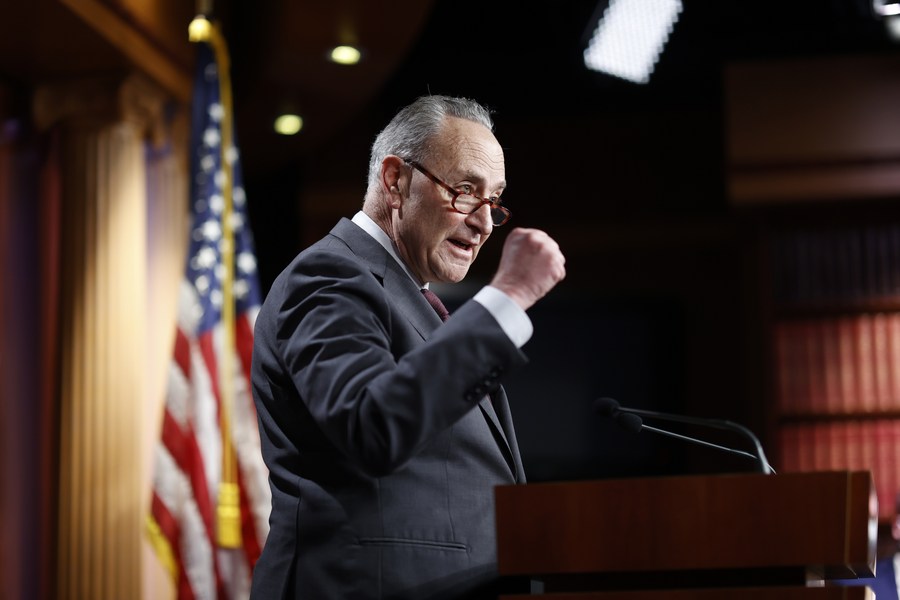U.S. Congress approves short-term spending bill as gov't shutdown deadline looms

Photo taken on Aug. 10, 2021 shows the U.S. Capitol building in Washington, D.C., the United States. (Xinhua/Liu Jie)
The last-minute stopgap funding bill, which would extend funding at current levels for most federal agencies and programs, now heads to President Joe Biden's desk.
WASHINGTON, Sept. 30 (Xinhua) -- The U.S. House of Representatives on Thursday passed a short-term spending bill to avert shutdown as government funding is set to expire in just a few hours, following a Senate approval earlier in the day.
By a vote of 254-175, the lower chamber approved the measure to keep the government funded through Dec. 3, averting a government shutdown at midnight. The Senate voted 65-35 to pass the bill.
The last-minute stopgap funding bill, which would extend funding at current levels for most federal agencies and programs, now heads to President Joe Biden's desk.
Senate Majority Leader Chuck Schumer said the bill would provide long-sought emergency funding to help Americans still reeling from natural disasters, such as Hurricane Ida, and provide funding to help re-settle Afghan refugees.

U.S. Senate Majority Leader Chuck Schumer speaks during a press conference on Capitol Hill in Washington D.C., the United States, Feb. 2, 2021. (Photo by Ting Shen/Xinhua)
The Congressional approval of the bill came after days of partisan fight over a debt limit provision, as Democrats had intended to incorporate a suspension of the debt limit into the short-term government spending bill, a move opposed by Republicans.
Republican lawmakers argued that Democrats should do that on their own, since they control both chambers of Congress and the White House, while complaining about a lack of bipartisanship in crafting the president's 3.5-trillion-U.S.-dollar spending plan.
Senate Republicans previously said that they would support a "clean" stopgap funding bill to avert a government shutdown, pressuring the Democrats to remove the debt limit provision. Schumer, the top Democrat in the Senate, announced Wednesday evening that an agreement had been reached.
"This week in the Senate proved that clumsy partisan jams will not work," Senate Minority Leader Mitch McConnell said on Twitter Thursday afternoon.
"We were able to avoid a shutdown because the Democratic majority accepted reality and listened to what Republicans have consistently said for months. Now they will need to do the same thing on the debt limit," said the Republican leader.
House Speaker Nancy Pelosi on Wednesday lashed out at Republicans over the debt limit issue. "Republicans - and because of all of the consequences that would happen if we did not lift the debt ceiling - Republicans refusal to support a suspension of the debt ceiling now, is cynical, hypocritical and downright dangerous," she said in a statement.
Democrats have the option to raise the debt limit on their own using a process known as budget reconciliation, which only requires a simple majority in the Senate to pass a legislation, but they have argued it's too risky.
With the stopgap funding bill approved and shutdown temporarily avoided, Democrats will need to act quickly in the coming days on the debt limit, as Treasury Secretary Janet Yellen recently warned that lawmakers have until Oct. 18 to raise or suspend the debt limit before the United States is expected to default on the national debt.

U.S. House Speaker Nancy Pelosi speaks during her weekly press conference on Capitol Hill in Washington, D.C., the United States, on May 13, 2021. (Photo by Ting Shen/Xinhua)
Yellen noted that Congress should not wait until the last minute to raise the debt limit as estimates regarding how long the remaining extraordinary measures and cash may last can "unpredictably shift forward."
Meanwhile, as Democrats try to pass a 3.5-trillion-U.S.-dollar spending package, a sweeping social spending bill that forms the core of Biden's domestic agenda, they are facing hurdles from Republicans as well as members of their own party.
Republicans want a much smaller package, while progressive Democrats have threatened to sink any such legislation. Democrats want to raise taxes on corporations and higher earners to offset the cost, but Republicans argued that it would lead to job loss and slower economic growth.
With the Senate split 50-50, Democrats must keep moderates -- who could oppose elements of the agenda -- on their side, allowing Vice President Kamala Harris to cast the deciding vote.
Some moderate Democrats, including Senator Joe Manchin of West Virginia and Senator Kyrsten Sinema of Arizona, have raised concerns about the potential cost of the package and the tax hikes proposed to pay for it, which has been a source of contention within the party.
Liberal Democrats, who have been particularly frustrated with Manchin and Sinema, said they plan to block the bipartisan infrastructure bill in an attempt to maintain leverage with party centrists on the cost and scope of the massive social spending package.
Photos
Related Stories
- U.S. hospitals overwhelmed with COVID-19 patients as cases surge: media
- Child COVID-19 cases make up 27 pct of total cases in U.S.: media
- America’s Haitian migrant border crisis a replay of racism, cruelty and horror
- Biden, Macron hold phone call over submarine deal rift
- Study may push back date COVID hit US
Copyright © 2021 People's Daily Online. All Rights Reserved.










